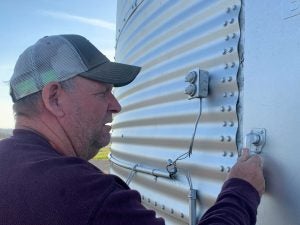As a farmer’s daughter and farmer’s wife, I have long been aware of the dangers that come with being in the agriculture industry. However, on top of the typical day-to-day dangers of the job — entanglement, moving equipment, grain bin entrapment, incorrect use of tools, and so much more — I am burdened with an extra worry when it comes to my family’s safety.
My dad, Andrew Gaines, was born without the ability to smell. While that is probably the last disability most people think of (if they even think of it at all), it is one that has many dangers in the agriculture industry and throughout his daily life. Many people may not realize that something so minor as lacking a sense of smell can amplify the dangers around you. However, people without that sense have more difficulty detecting fires or recognizing the warning signs of poisonous fumes, leaking gas, or food that has spoiled.
Anosmia, as it is called, is the complete or partial loss of smell (as opposed to the temporary loss of smell associated with the coronavirus). It can either be hereditary or due to an injury. Unfortunately, my dad is in the first category — according to his memory, he has never been able to smell — along with one of my aunts and my older sister.
Growing up I don’t think I realized the dangers of the job and what the inability to smell really meant for my dad’s occupation. When he would ask me to smell the milk, I didn’t realize that he also wouldn’t be able to smell a gas leak either. However, as I grew up, the dangers became more alarming. I could see the worry on my mother’s face as he told her the story about how his eyes watered when he opened a jug of chemical too quickly. I noticed how my dad’s inability to smell seemed to affect those around him more than it affected him.
In our family it was common knowledge that our family members couldn’t smell. However, even though it is one of the five senses, people often have a tough time wrapping their head around the idea of never being able to smell. Not knowing the aroma of fresh flowers, the unique scent of each of your loved ones, or how treats like freshly popped popcorn can dance through your nose.
Sadly, people with anosmia never know what they don’t know.
Living a seemingly “normal” life, dad has always had to consider what unknown dangers are involved in the job. Growing up on a farm in Southeast Missouri, he was expected to work just as hard as everybody else — he had to get the job done, safely.
My dad grew up in the “just do it” generation — nobody cared how the job got done, you just had to do it.
When thinking about his younger days and growing up without the ability to smell, he said, “My dad made me do everything. It didn’t matter what he had going on, he always had me doing typical work around the house and shop.”
Growing up, his family had livestock, cut clover for hay, and grew corn, soybeans, cotton, and wheat. As he got older and took on more roles on the farm, he had to take extra steps to stay safe. For example, it was his responsibility to operate the sprayer. Without the ability to smell, he had to be particularly careful with the chemicals he would use, along with the amount applied.
My dad could not rely on his sense of smell to warn him of strong chemicals, instead relying on alternative steps to stay safe. For example, he would always stand upwind to make sure the smell and bad chemicals would blow away from him instead of toward him. Certain jugs would make his eyes water, and he knew he had to be extremely careful with those chemicals.

Working with the sprayer was just one increased risk for someone with anosmia. Grain bins can also be dangerous, from the gas used to dry grain or if grain has turned bad.
“Sometimes we would be in the grain bin, and if we would have a gas smell in there, my eyes would water but my brother’s eyes would not,” my dad explains. “I guess that is where one of my other senses would work faster than his would.”
Yet, for as valuable and versatile as my dad has been throughout his life as a farmer, there was one job he was never allowed to do. His brother, John, who was also his partner in farming, would not let my dad drive the combine alone. John was worried about the combine’s belts slipping and causing a fire, and that my dad would not sense it until it was too late. John, on the other hand, would be able to smell the fire before he could see it and could save the combine from being engulfed in the ensuing flames.
Of course, my dad’s condition also meant that he was handed certain farm tasks because no one else wanted them. Anyone who has ever had to spread chicken litter knows exactly where I am going with this. Let’s just say it does not smell like roses. Considered a “shitty” job, my dad got this job and others that centered around off-putting smells.
Thankfully, since the family got rid of the livestock years ago, he hasn’t had to muck a stall for a while.
While the less desirable tasks were a humorous byproduct of anosmia, they also served to bring a bit of levity to what is otherwise a serious condition, especially in an agricultural environment. This industry poses dangers that the rest of the world doesn’t even think about, and growing up with a disability like my dad’s means he learned to work around it — to adapt and still get the job done. It’s not like America can do with fewer farmers and ranchers.
Kacie Hulshof, the Associate Editor for AGDAILY, is a farmer’s daughter and farmer’s wife, but most importantly an advocate for farmers and ranchers. Growing up on a farm she was able to experience all the joys and hardships that comes with that life. Her passion for agriculture grew so strong she decided to dedicate her life to telling the story of the agriculture industry.



